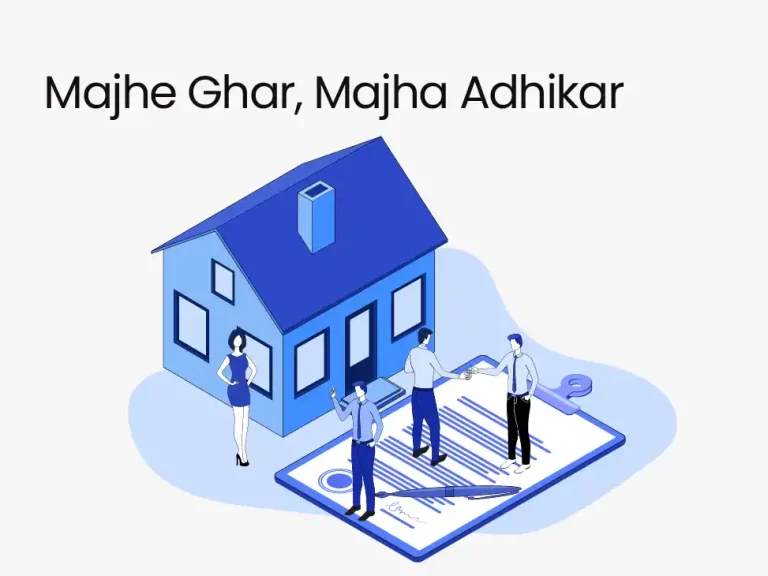Rashi Sood
Last Updated on 22nd July 2025

Rashi Sood
Last Updated on 22nd July 2025
The Maharashtra government launched its new housing policy 2025, Majhe Ghar, Majha Adhikar (My Home, My Right) on May 20, 2025. This new housing policy by the Maharashtra government aims to provide affordable, sustainable, and inclusive housing to various sections of society. The policy focuses on transparency, real-time monitoring, and accountability and leverages IT-based systems to track beneficiaries, monitor project progress, and manage funds effectively. This marks a significant update, as the previous housing policy in Maharashtra was last introduced 18 years ago, in 2007. Majhe Ghar, Majha Adhikar targets constructing 35 lakh affordable homes by 2030 with an investment of ₹70,000 crore, setting a bold vision for urban development.
Table of Contents
The core objective of the policy is to ensure housing for all by 2030. The government plans to achieve this by:
Suggested read: YEIDA’s Plot Scheme
The policy prioritizes the construction of affordable homes for the EWS and LIG categories. Key initiatives include:
To rejuvenate aging housing societies, the policy introduces:
The government aims to create a land bank for residential use by 2026, coordinated across various departments. This initiative will:
Supporting the ‘Walk-to-Work’ concept, the policy mandates that 10–30% of land designated for amenity plots in industrial areas be reserved exclusively for residential use. This will:
The policy emphasizes slum rehabilitation through a cluster redevelopment approach, including:
To combat climate risks, the policy promotes:
The policy introduces the Maha Awas Portal, a centralized digital platform powered by artificial intelligence. This portal will:
Recognizing the diverse needs of its population, the policy includes special housing schemes for:
Suggested read: GPRA Housing Scheme
The implementation of this policy is expected to:
Majhe Ghar, Majha Adhikar is Maharashtra’s new housing policy that marks a significant step towards addressing the state’s housing challenges. By focusing on affordability, inclusivity, sustainability, and resilience, the policy aims to provide housing for all by 2030. The comprehensive approach, including self-redevelopment support, government land utilization, walk-to-work housing, slum rehabilitation, and digital governance, sets a robust framework for urban development in the state.
The ‘Majhe Ghar, Majha Adhikar’ housing scheme is a comprehensive initiative launched by the Maharashtra government to provide affordable, sustainable, and inclusive housing for various sections of society. The policy focuses on offering quality residences to Economically Weaker Sections (EWS), Low-Income Groups (LIG), and other marginalized communities.
The eligibility criteria for applying under the ‘Majhe Ghar, Majha Adhikar’ housing scheme are primarily aimed at those from lower-income groups and marginalized communities. The following groups are eligible:
EWS and LIG
Senior citizens, students, and working women
Differently-abled individuals and those from other vulnerable sections
Industrial workers and journalists with specific provisions
Cooperative housing societies looking to redevelop their properties
Please note that the applicants must meet specific income limits and residence criteria, which will be clarified during the application process.
The policy provides affordable housing in the form of:
Rent-to-own models that allow residents to rent a house for a period (up to 10 years) with an option to buy.
Affordable rental housing, especially near industrial areas and hospitals.
Self-redevelopment homes for cooperative housing societies.
Sustainable, climate-resilient houses designed using green building practices, including energy-efficient technologies and eco-friendly materials.
Special housing for senior citizens, students, and differently-abled individuals.
Yes, the ‘Majhe Ghar, Majha Adhikar’ housing policy offers financial assistance and subsidies in various forms:
Subsidized housing for EWS and LIG categories to ensure that homes are affordable for low-income groups.
Low-interest loans and subsidized rates for applicants, especially for those from vulnerable categories.
Special incentives for redevelopment projects, including tax breaks and funding assistance for cooperative housing societies.
Rent-to-own schemes offer affordable payment options for those who may not have immediate access to a home loan.
Applications for a house under the ‘Majhe Ghar, Majha Adhikar’ housing scheme can be made through the Maha Awas Portal.
Are there any reservation quotas for specific categories?
Yes, the ‘Majhe Ghar, Majha Adhikar’ housing policy includes reservation quotas for certain categories, including:
EWS and LIG, ensuring a significant portion of houses are allocated to these groups.
Senior citizens, students, and working women benefit from reserved housing near educational and employment hubs.
Differently-abled individuals will receive specially designed homes to meet their accessibility needs.
Industrial workers are prioritized for housing near industrial zones under the ‘Walk-to-Work’ model.
The selection process for beneficiaries under the ‘Majhe Ghar, Majha Adhikar’ scheme is carried out in a transparent and systematic manner. Key steps in the process include:
Application submission via the Maha Awas Portal.
Document verification to confirm eligibility.
Randomized selection through a lottery system or other fair methods for those who meet the criteria.
Real-time tracking via the portal to ensure transparency and prevent fraud.
Final approval by local authorities and government officials.
Applicants can track the status of their application and check the details of their selection process through the Maha Awas Portal.
In most cases, individuals who already own a house may not be eligible for the scheme, as it primarily targets those without adequate housing. However, there are specific provisions for individuals looking for:
Self-redevelopment options, where cooperative societies can apply for the redevelopment of their existing properties.
Affordable rental housing options or rent-to-own models if their current housing situation does not meet their needs.
The final eligibility will depend on the specific conditions outlined in the policy and the applicant’s current housing status. For those seeking redevelopment options, there may be allowances for participation if they meet specific criteria.